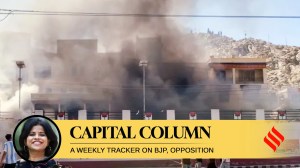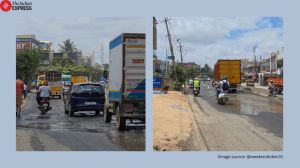Observing that the “matter pertains to liberty”, the Supreme Court Monday decided to hear Thursday a plea by Sara Abdullah Pilot challenging the detention of her brother and National Conference leader Omar Abdullah under the stringent Public Safety Act.
The bench of Justices Arun Mishra and Indira Banerjee decided to hear the plea at an early date after the J&K administration told the bench “there was ample material and grounds to issue the impugned order of detention against” the former J&K Chief Minister “considering the past conduct and the possibility of such conduct being repeated on release and thereby prejudicing the public order in the Union Territory of Jammu and Kashmir”.

The PSA was invoked last month against Omar Abdullah and PDP leader Mehbooba Mufti, also a former Chief Minister, six months after they were taken into preventive detention in the wake of the abrogation of Article 370 on August 5.
Story continues below this ad
Omar’s sister Sara approached the Supreme Court calling his detention illegal. She said Omar had been in custody for six months, had no access to any form of public speech and expression and, therefore, there could be no reason/material to conclude that he may act in any manner prejudicial to maintenance of public order.
In an affidavit filed in response to her petition, the Srinagar District Magistrate urged the bench to examine “contextually” the concept of public order as regards the region, keeping in mind its “very peculiar geopolitical position… and its geographical proximity with Islamic Republic of Pakistan”.
The affidavit said that “in view of a historical decision taken to abrogate Article 370, it is the subjective satisfaction of the detaining authority” that the release of Omar would pose at threat to public order.
It said his detention was ordered after “careful perusal” of the material produced by the Senior Superintendent of Police, Srinagar “and on being satisfied that it is necessary to detain the detenu with a view to prevent him from acting in any manner prejudicial to the maintenance of public order”.
Story continues below this ad
This, it said, was submitted to the Advisory Board comprising a retired High Court judge and two Principal Judges who, by their opinion on February 24, said “there is sufficient cause for the detention of the detenu”. By an order dated February 26, the Union Territory government confirmed this.
It said Omar had also “chosen not to file” a representation before the Advisory Board. It said he was being kept in Hari Niwas, temporarily declared a subsidiary jail.
It referred to the number of those killed in the region since 1990 and said 41,866 people — 4,038 civilians, 5292 security personnel and 22,536 terrorists — had lost their lives in 71,038 incidents throughout the erstwhile State of J&K.
“These figures would satisfy this Hon’ble Court that satisfaction of the competent authority regarding that of preventive measure for maintenance of ‘public order’ shall have to be viewed in the context of peculiar situation arisen in Jammu and Kashmir and Ladakh for which Jammu and Kashmir Public Safety Act, 1978 is enacted,” it said.
Story continues below this ad
The District Magistrate said Omar should have approached the High Court before approaching the Supreme Court. The 2003 ruling in Union of India vs Paul Manickam, the DM said, made clear that “it is imperative to approach the Honourable High Courts of the country in matters concerning preventive detention”.
The affidavit said Omar had failed to disclose the reason or justification for not approaching the J&K HC. “Entertaining one petition would open floodgates of petitions which, in absence of any special ground to make a departure, needs to be avoided,” it stated.

 Detained on August 5, under PSA since Feb.
Detained on August 5, under PSA since Feb.






